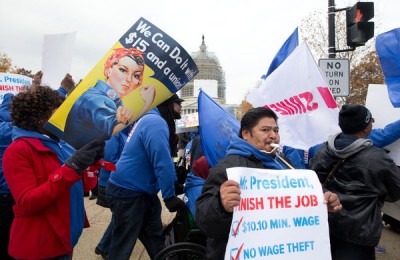Oregon Unions Rally for a $15 Minimum Wage

Hundreds rallied On January 24th at Oregon’s capitol building to demand a statewide $15 minimum wage. The rally marked the beginning of a statewide campaign that has already earned support from Oregon’s labor movement and many community groups.
The rally itself was organized by a coalition of labor and community groups, including $15now Oregon, the Oregon School Employee Association, SEIU 503, and the Oregon AFL-CIO. Several other unions contributed financially or with outreach to their members.
The media attention the rally garnered has added fuel to the media fire sparked by the $15 demand, where Oregon Democrats won midterm elections on vague promises to raise the minimum wage. This public discussion led by Democrats was hijacked by the volunteer-led group $15now pdx, which did intensive outreach to Oregon’s unions that eventually adopted the demand, pushing the movement forward to the point that the entire state is discussing $15.
Now $15 is regularly featured in newspapers and subjected to live TV debates, where recently $15now organizer Justin Norton-Kerston scored a thumping victory over a representative from a rightwing think tank. In this way new ideas are being broadcasted around the state.
Oregon’s campaign for $15 was imported from the victorious union campaigns in Seattle and San Francisco. In fact, a fall event in Portland co-organized by $15now pdx featured two union organizers that helped lead those victories, inspiring many in attendance to join the Oregon campaign.
Although public pressure has led some Oregon Democrats to introduce legislation for a $15 minimum wage—sixteen legislatures are co-sponsoring the bill—it’s unlikely that Oregon legislators will pass a bill for $15 minimum wage. It appears that most Democrats either support a competing bill for $12, or no raise at all.
It’s therefore politically significant that Oregon’s labor unions are backing $15, since doing so is choosing political independence over a major statewide issue, whereas normally union politics are closely tied to Oregon’s Democratic Party.
The fact that Oregon’s Democrats likely won’t pass $15 won’t deter $15now activists, because Oregon’s ballot initiative process allows the question to be directly posed to voters, so long as enough signatures are gathered to trigger a referendum. Thus, the question is likely to be determined by ballot in 2016.
$15now organizers are very confident that voters will make Oregon the first state to have a $15 minimum wage, which will automatically pose the question for labor unions in other states. Unions should utilize the ballot initiative process wherever their state allows, since the fight for $15 has already had a galvanizing effect on the labor movement, which is fighting for its very survival.
Where $15 is victorious the wage floor is lifted, strengthening workers bargaining power and pressuring employers to give raises to their employees who already make $15 or slightly above. There is simply no better way to directly tackle inequality then immediately raising the minimum wage to $15. The labor movement has a chance to re-establish itself as the champion of working people. It shouldn’t blow this historic opportunity.
Shamus Cooke is a social service worker, trade unionist, and writer for Workers Action (www.workerscompass.org). He can be reached at [email protected]

